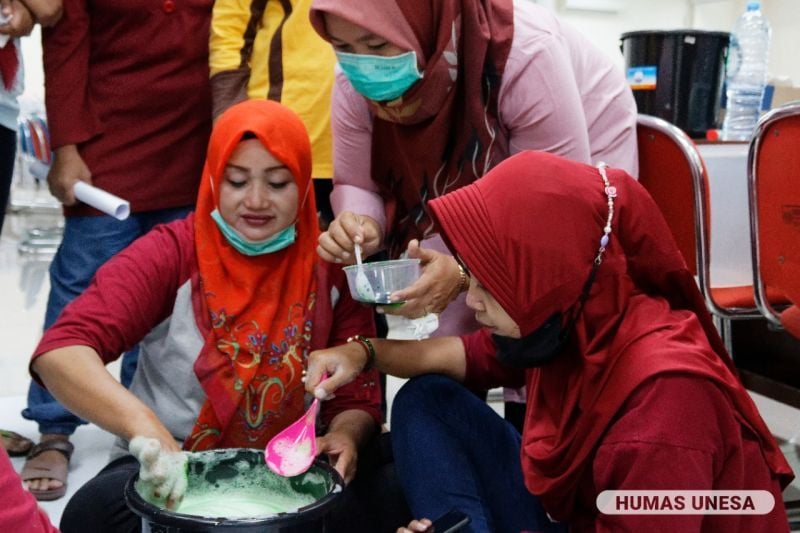
www.unesa.ac.id
Unesa.ac.id, SURABAYA–In order to empower and increase public opinion, the UNESA lecturer team held a training on making health soap and household soap for the residents of Lidah Kulon and Lidah Wetan, Lakarsantri District, Surabaya on Friday (17/12/2021) on the 6th Floor of the UNESA Rectorate Building, Lidah Wetan Campus.
The lecturer team in question consisted of Kunjung Ashadi, S.Pd., M.Fis.AIFO., Prof. Dr. Sari Edi Cahyaningrum, M.Sc., Lutfi Saksono, S.Pd., M.Pd., and Biyan Yesi Wilujeng, S.Pd., M.Pd.
Kunjung Ashadi, the chief executive stated that the activity was attended by 30 local residents, the majority of whom were housewives. Residents were given training in making soap from easily available ingredients. In addition, there is also a sharing about packaging and marketing.
The training is packaged in a simple way, namely in the form of providing material, joint practice and there is a performance test. Enthusiasm was clearly seen on the faces of the participants during the training. Residents are very excited and actively ask questions. “This activity is intended to make participants skilled in making various kinds of soap. There are itching, beauty soap, acne soap, hand sanitizer, dishwashing liquid and liquid soap," he said.
He added that the program does not only extend to training, residents will continue to be provided with regular assistance, including in terms of packaging and marketing. Then, the future direction is to form community business groups, especially those engaged in the production of various soaps.
Lutfi Saksono said that making soap is actually very easy and the raw materials are not too difficult to find. Besides being more economical, it can also be relied on as income and improve the community's economy. "Especially during this pandemic, the need for clean living is very important, we wash our hands regularly, of course we need soap, instead of buying it, we should produce it ourselves," he said.
He hopes that the training can help maximize the entrepreneurial potential that exists in the community. In addition, it can improve the community's economy during the pandemic and post-pandemic. “This can be very good for a citizen's business. Residents can produce their own and market it. Because the way to make it is very easy and the quality can be better than the products on the market,” he said. [UNESA PR]
Reporter: Hasna
Editor: @zam*
Share It On:






